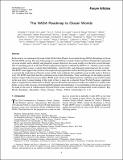The NASA Roadmap to Ocean Worlds
Author(s)
Hendrix, Amanda R.; Hurford, Terry A.; Barge, Laura M.; Bland, Michael T.; Bowman, Jeff S.; Brinckerhoff, William; Buratti, Bonnie J.; Cable, Morgan L.; Castillo-Rogez, Julie; Collins, Geoffrey C.; Diniega, Serina; German, Christopher R.; Hayes, Alexander G.; Hoehler, Tori; Hosseini, Sona; Howett, Carly J.A.; McEwen, Alfred S.; Neish, Catherine D.; Neveu, Marc; Nordheim, Tom A.; Patterson, G. Wesley; Patthoff, D. Alex; Phillips, Cynthia; Rhoden, Alyssa; Schmidt, Britney E.; Singer, Kelsi N.; Soderblom, Jason M.; Vance, Steven D.; ... Show more Show less
DownloadPublished version (1.907Mb)
Publisher Policy
Publisher Policy
Article is made available in accordance with the publisher's policy and may be subject to US copyright law. Please refer to the publisher's site for terms of use.
Terms of use
Metadata
Show full item recordAbstract
In this article, we summarize the work of the NASA Outer Planets Assessment Group (OPAG) Roadmaps to Ocean Worlds (ROW) group. The aim of this group is to assemble the scientific framework that will guide the exploration of ocean worlds, and to identify and prioritize science objectives for ocean worlds over the next several decades. The overarching goal of an Ocean Worlds exploration program as defined by ROW is to "identify ocean worlds, characterize their oceans, evaluate their habitability, search for life, and ultimately understand any life we find." The ROW team supports the creation of an exploration program that studies the full spectrum of ocean worlds, that is, not just the exploration of known ocean worlds such as Europa but candidate ocean worlds such as Triton as well. The ROW team finds that the confirmed ocean worlds Enceladus, Titan, and Europa are the highest priority bodies to target in the near term to address ROW goals. Triton is the highest priority candidate ocean world to target in the near term. A major finding of this study is that, to map out a coherent Ocean Worlds Program, significant input is required from studies here on Earth; rigorous Research and Analysis studies are called for to enable some future ocean worlds missions to be thoughtfully planned and undertaken. A second finding is that progress needs to be made in the area of collaborations between Earth ocean scientists and extraterrestrial ocean scientists.
Date issued
2019-01Department
Woods Hole Oceanographic Institution; Massachusetts Institute of Technology. Department of Earth, Atmospheric, and Planetary SciencesJournal
Astrobiology
Publisher
Mary Ann Liebert Inc
Citation
Hendrix, Amanda R. et al. "The NASA Roadmap to Ocean Worlds." Astrobiology 19, 1 (January 2019): 1-27 © 2018 The Author(s)
Version: Final published version
ISSN
1531-1074
1557-8070